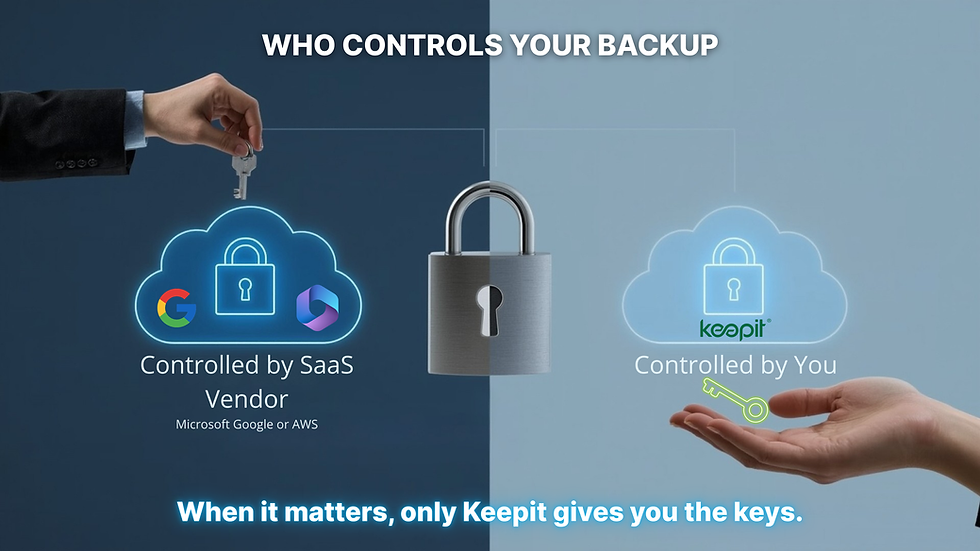Sovereignty Isn’t Where Your Data Lives - It’s Who Holds the Strings
- David Long

- Jul 29, 2025
- 4 min read
Updated: Aug 8, 2025

Sovereignty Isn’t Where Your Data Lives - It’s Who Holds the Strings
Why Microsoft’s CLOUD Act Admission Is a Wake-Up Call for Australia - and What Real Backup Independence Looks Like
When Microsoft’s legal director told a French Senate hearing in July 2025:
“No, I cannot guarantee that data stored in EU data centers will not be transmitted to U.S. authorities,”
…he didn’t just confirm a European risk. He revealed the strings - and who’s holding them.
Because if France, a country with GDPR protections and strict data residency mandates, can’t get a guarantee…What hope do we have here in Australia or New Zealand?

The CLOUD Act Doesn’t Respect Borders
The U.S. CLOUD Act (Clarifying Lawful Overseas Use of Data Act) allows U.S.-headquartered tech companies - like Microsoft, Google, and Amazon - to be compelled to hand over customer data regardless of where that data is physically stored.
Even if:
The data resides in a Sydney or Singapore data centre
It belongs to an Australian government agency or regulated financial institution
It’s governed by local contracts or sovereign retention agreements
If the company is U.S.-based, a valid order means the data must be surrendered. No court in Australia. No customer notification. No consent from local authorities.
The law follows the vendor, not the data.
This isn’t hypothetical. It’s a matter of compliance, jurisdiction, and control.
Why Australia Is More Exposed Than the EU
Unlike the EU, Australia has no legal “blocking statutes” that limit how foreign governments access locally stored data. We have no GDPR-style data adequacy framework. No legislative resistance to U.S. discovery orders.
We’ve been relying on contracts, cloud marketing, and blind trust. Microsoft’s own admission proves - that’s no longer enough.
This raises a brutal truth:
Even with your SaaS data “hosted in Australia,” You may still be subject to foreign access and oversight.

The Sovereignty Mirage
Many organisations assume that selecting an Australian region or ticking the “local storage” box in a cloud console guarantees compliance.
But let’s be clear: Data stored on Microsoft 365, AWS, or another public cloud is still governed by that vendor’s identity systems, policy controls, and legal obligations -including foreign laws like the U.S. CLOUD Act.
You don’t control the infrastructure. You don’t control access. You don’t even control your backups.
And when something breaks - whether it’s ransomware, a misconfiguration, or foreign legal action - your recovery path could disappear with it.
That’s why true resilience demands more than just “local storage.” It demands independence from the platform you’re protecting.

The Case for Backup Independence
In this new reality, resilience isn’t just about having a copy of your data. It’s about where that copy lives. Who controls it. And who can’t touch it.
That’s why FullBackup has partnered with KeepIt - the only independent SaaS backup provider built from the ground up to deliver:
✅ Immutable, air-gapped backups
✅ Sovereign hosting in Australia
✅ No dependency on U.S. cloud platforms
✅ Support for Microsoft 365, Entra ID, Google, Salesforce, Jira, DevOps, and more
KeepIt stores your data outside the Microsoft ecosystem. It has no shared policy engine, no common identity framework, and no exposure to the same legal orders.
When Microsoft says they can’t guarantee sovereignty, we can confidently say - we’re not part of their risk.

Sovereignty, Compliance & Control: CPS 230 and Beyond
With the introduction of CPS 230, Australia’s financial institutions face growing pressure to prove operational resilience and third-party independence.
And yet - too many still rely on SaaS vendors for backup. The same vendors that:
Own the infrastructure
Write the policies
Can be legally compelled to comply with foreign subpoenas
That’s not resilience. That’s risk by design.
True operational independence requires:
Separate control planes
Legally isolated storage
Guaranteed restore paths outside the production platform
That’s what KeepIt delivers. And that’s what FullBackup enables - as a valued Keepit resale partner, we can get you protected in minutes, not days or months. Immutable. Independent. Fully compliant.
The Leadership Lesson
Microsoft’s admission in France wasn’t a bug in the system. It was a feature of how global cloud platforms operate.
For too long, backup has been seen as a “nice to have” - until it’s too late.
Now, we know:
You can't outsource responsibility just because you outsourced infrastructure
You can’t afford to confuse uptime with recovery
And you definitely can’t equate data hosting with sovereignty

Final Word
Your SaaS provider’s job is to keep the lights on.
Your job is to ensure your data survives when they don’t.
So if you’re storing all your backups inside the same legal and technical framework as your production environment - ask yourself:
What happens when that system fails?
Who really owns your recovery?
And who has the final say over your data?
If the answer isn’t you - let’s fix that.
Talk to FullBackup. We’ll show you what real backup independence looks like - immutable, sovereign, and under your control.
Book a demo, start a pilot, or just talk to us: https://lnkd.in/gx5cK_2i




This is something that just came up for us this week
Very insighful